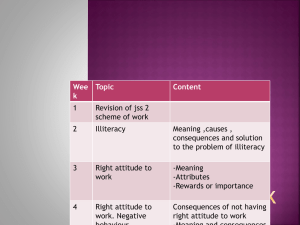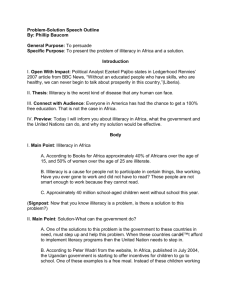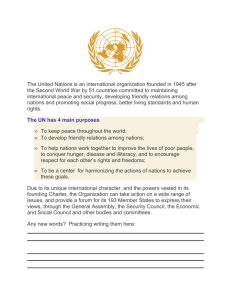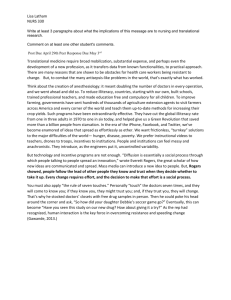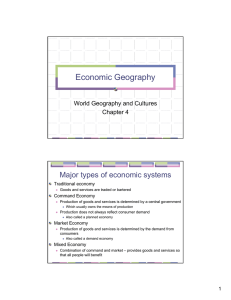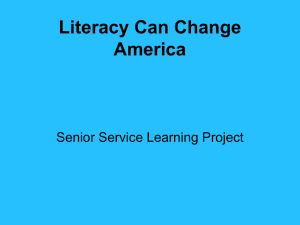Forced Illiteracy of Women, the Incidence of the Rural Areas
advertisement
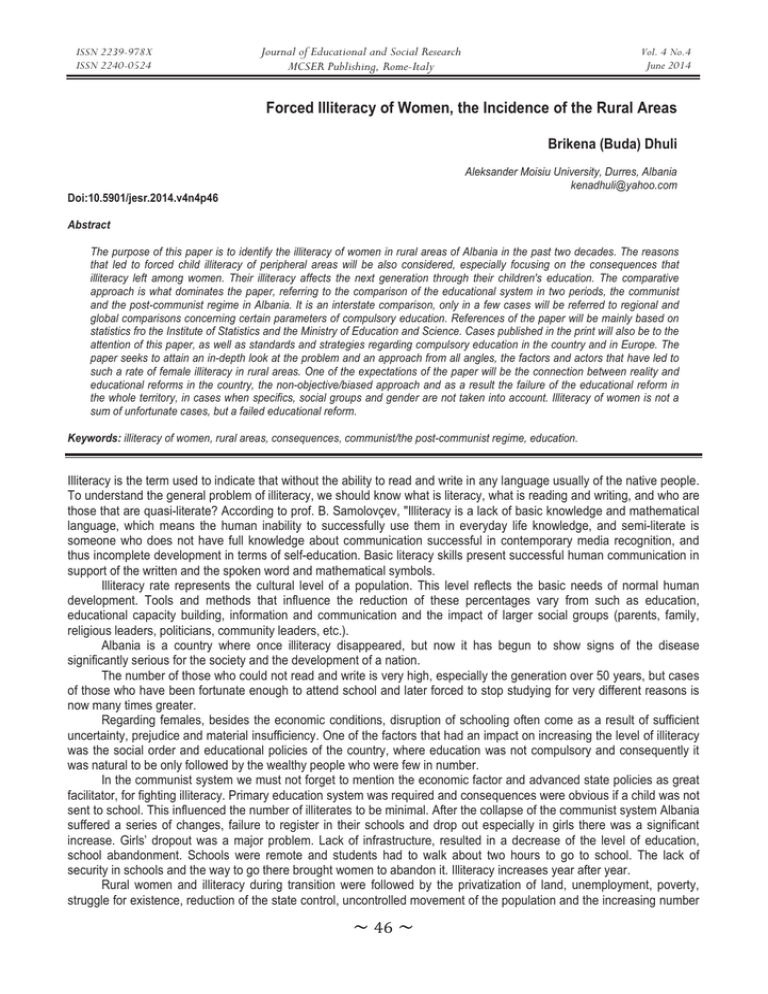
ISSN 2239-978X ISSN 2240-0524 Journal of Educational and Social Research MCSER Publishing, Rome-Italy Vol. 4 No.4 June 2014 Forced Illiteracy of Women, the Incidence of the Rural Areas Brikena (Buda) Dhuli Aleksander Moisiu University, Durres, Albania kenadhuli@yahoo.com Doi:10.5901/jesr.2014.v4n4p46 Abstract The purpose of this paper is to identify the illiteracy of women in rural areas of Albania in the past two decades. The reasons that led to forced child illiteracy of peripheral areas will be also considered, especially focusing on the consequences that illiteracy left among women. Their illiteracy affects the next generation through their children's education. The comparative approach is what dominates the paper, referring to the comparison of the educational system in two periods, the communist and the post-communist regime in Albania. It is an interstate comparison, only in a few cases will be referred to regional and global comparisons concerning certain parameters of compulsory education. References of the paper will be mainly based on statistics fro the Institute of Statistics and the Ministry of Education and Science. Cases published in the print will also be to the attention of this paper, as well as standards and strategies regarding compulsory education in the country and in Europe. The paper seeks to attain an in-depth look at the problem and an approach from all angles, the factors and actors that have led to such a rate of female illiteracy in rural areas. One of the expectations of the paper will be the connection between reality and educational reforms in the country, the non-objective/biased approach and as a result the failure of the educational reform in the whole territory, in cases when specifics, social groups and gender are not taken into account. Illiteracy of women is not a sum of unfortunate cases, but a failed educational reform. Keywords: illiteracy of women, rural areas, consequences, communist/the post-communist regime, education. Illiteracy is the term used to indicate that without the ability to read and write in any language usually of the native people. To understand the general problem of illiteracy, we should know what is literacy, what is reading and writing, and who are those that are quasi-literate? According to prof. B. Samolovçev, "Illiteracy is a lack of basic knowledge and mathematical language, which means the human inability to successfully use them in everyday life knowledge, and semi-literate is someone who does not have full knowledge about communication successful in contemporary media recognition, and thus incomplete development in terms of self-education. Basic literacy skills present successful human communication in support of the written and the spoken word and mathematical symbols. Illiteracy rate represents the cultural level of a population. This level reflects the basic needs of normal human development. Tools and methods that influence the reduction of these percentages vary from such as education, educational capacity building, information and communication and the impact of larger social groups (parents, family, religious leaders, politicians, community leaders, etc.). Albania is a country where once illiteracy disappeared, but now it has begun to show signs of the disease significantly serious for the society and the development of a nation. The number of those who could not read and write is very high, especially the generation over 50 years, but cases of those who have been fortunate enough to attend school and later forced to stop studying for very different reasons is now many times greater. Regarding females, besides the economic conditions, disruption of schooling often come as a result of sufficient uncertainty, prejudice and material insufficiency. One of the factors that had an impact on increasing the level of illiteracy was the social order and educational policies of the country, where education was not compulsory and consequently it was natural to be only followed by the wealthy people who were few in number. In the communist system we must not forget to mention the economic factor and advanced state policies as great facilitator, for fighting illiteracy. Primary education system was required and consequences were obvious if a child was not sent to school. This influenced the number of illiterates to be minimal. After the collapse of the communist system Albania suffered a series of changes, failure to register in their schools and drop out especially in girls there was a significant increase. Girls’ dropout was a major problem. Lack of infrastructure, resulted in a decrease of the level of education, school abandonment. Schools were remote and students had to walk about two hours to go to school. The lack of security in schools and the way to go there brought women to abandon it. Illiteracy increases year after year. Rural women and illiteracy during transition were followed by the privatization of land, unemployment, poverty, struggle for existence, reduction of the state control, uncontrolled movement of the population and the increasing number ̱Ͷ̱ ISSN 2239-978X ISSN 2240-0524 Journal of Educational and Social Research MCSER Publishing, Rome-Italy Vol. 4 No.4 June 2014 of school dropouts of the elementary schools from girls and their engagement in farming. Illiteracy of women and girls in rural areas was 15.84% in 1998. Besides leaving because of the conditions, we note that the number of secondary schools has also fallen. From the 428 such schools in the countryside in 1992, there were only 252 in 1998. Decrease in the number of secondary schools has been accompanied by the decline in the number of girls attending school. Also, the number of students from the countryside dropped drastically, and figures show that in 1998 they accounted for 11% of girl students (Ekonomi, Muço and Rama, 1999: 78-9). Later studies reinforce the concerns conveyed by the figures above. INSTAT data for 2001 show that if the 25-29 year-old age group is 45.5 % of rural women with secondary education and above, for the 15-19 year-old age group, the percentage is only 14.7% (INSTAT, 2005: 24), which shows that women in the countryside are increasingly less educated. The same conclusion was reached from a study of the Ministry of Education and Science and the UNDP in 2005, under which the 20,48 % of them are without a degree, 68.15 % with only the elementary school, 10.60 % with the high school and 0.77 % with a university degree (2005: 41-2). De Soto et.al. argue that besides the closing of schools and poor infrastructure, children not are not attending school mainly for reasons such as the economic difficulty, the higher uncertainty and the decline of the importance of school evaluation in people's lives. If the economy is doing bad, the boys leave school for employment. As far as girls are concerned, the cultural factors, preferences of parents who consider it as unnecessary for girls education, economic difficulties and inability to cope with their education, as well as fear for their safety are the main reason for leaving school (2002: 59-61). Consequently, the decline in the level of education affects not only the preparation of girls and women in the countryside, but also their expectations for life and vision of the role and rights in society, and consequently adversely affects their awareness for the necessity of their engagement and political representation. According to the Ministry of Education, this phenomenon was at 3-5% of the population in the entire territory of the country. A recent study of the World Bank finds out that 12% of the population in Albania are illiterate. As most problematic areas and the highest number of illiterates are considered areas such as: Dibra, Mallakastra, Kukes. While talking about the European Union, such questions come out as: “what will happen tomorrow with all these children who grow up in these situations as citizens of the European Union?” and, “with what knowledge will they face the European Union?”. According to UNESCO, it is said that "the person who knows how to read and understands the text, but that is not able to write a text of ordinary daily life, is known as a semi-literate", but “he who does not know how to write and read is called illiterate”. Statistics arising from UNSKO convince us that in the world there are many people who do not know how to read and write, and there are those who know the characters, but do not understand what it read. Therefore, illiteracy is a problem that should be taken seriously. The data say that in the world 965 million people are illiterate. And a more bitter fact is that this number is not in reduction, but rather increased. Data from 1985, according to a report from UNSKO, in 100 adults in the world 30 of them are illiterate. It is also interesting to note that 702 million are concentrated in 10 states: 6 of which in Asia, 3 in Africa and one in Latin America. In the Asian continent in the top of the list are countries like India, China, Jordan, Thailand etc. Only in China over 80 million are illiterate or quasi-illiterate, and in some regions of China the percentage reaches 90%. The most drastic example of illiteracy in Africa (Nigeria, Libya, Ethiopia, Ghana, Egypt), and in Latin America with the largest number of illiterates in lead countries such as Peru, Venezuela, Ecuador, Colombia, Chile, Bolivia, etc. These data clearly show that illiteracy was not only characteristic of undeveloped countries, but also countries under development. In the dramatic spread of this phenomenon many factors have a great impact, such as fertility, life conditions, the large number of languages and speaking, the large number of tribes, the status of women in family planning, unemployment, wars and cultural stagnation of development, which are usually characteristic of undeveloped countries and developing countries. According to the World Bank functional illiteracy in Albania is 57%. Not infrequently, we compare everything to the world even though the level, conditions or standards are different. In the Western countries as functionally illiterate are mainly classified children or adults who have mental disorders as well as immigrants who have trouble with the language and could not understand well, therefore neither can interpret correctly. However, in Albania, children are Albanian and they have their own language and speak it everyday, but do not understand what they read. 1. Recommendations 1. 2. The improvement of the quality of school programs and improvement of the attendance of women and girls in the teaching, planning and management of education. The strengthening of the capacity of educational institutions to integrate the issues and concepts of gender ̱Ͷ̱ ISSN 2239-978X ISSN 2240-0524 3. Journal of Educational and Social Research MCSER Publishing, Rome-Italy Vol. 4 No.4 June 2014 equality in planning implementation and monitoring in education. The improvement of social and cultural attitudes of the communities and families that promote values and the importance of girls' education, including the roles and contributions of women and girls in development. Bibliography Banaczak, L. A. & Plutzer, E. “Contextual Determinants of Feminist Attitudes: National and Subnational Influences in Western Europe” in The American Political Science Çuli, D. Ese për Gruan Shqiptare. Tiranë: FPGSH “Dora D’Istria”, 2000. De Soto, H. Gordon, P. Gedeshi, I. Sinoimeri, Z. Poverty in Albania. Washington DC:World Bank, 2002. Ekonomi, M. Sokoli, L. Danaj, S. & Picari, B. Përfaqësimi dhe Cilësia e Demokracisë në Shqipëri: Një Perspektivë Gjinore. Tiranë: Pegi, 2006. Ekonomi, M. Muço, M. & Rama, F. “Gruaja dhe Ekonomia në Tranzicionin Shqiptar” në Studim mbi Kontributin e Shkruar të Lëvizjes së Gruas në Shqipëri 1990-1998. INSTAT. Të Ndjehesh i Rritur në Shqipëri. Tiranë: INSTAT, 2005. INSTAT. Gender Perspectives in Albania. Tiranë: INSTAT, 2004. Ministria e Punës, Çështjeve Sociale dhe Shanseve të Barabarta & UNDP. Analiza Gjinore e Politikave në Sektorin e Punësimit në Shqipëri. Tiranë. 2005. Ministria e Arsimit dhe Shkencës. Analiza Gjinore e Politikave në Sektorin e Arsimit në Shqipëri. Tiranë. 2005. The Role of Mass Media” in The American Political Science Review. Vol. 95. Nr. 1.March 2001. Qendra e Gruas, Reporting on Gender and Agriculture. Tiranë. 2003. Qirjako, S. & Dhimitri, R. “Shoqëria Civile dhe Lëvizja Asociative e Lirë e Gruas” në Studim mbi Kontributin e Shkruar të Lëvizjes së Gruas në Shqipëri 1990-1998. UNDP Albania. A Survery on the Status of Women in Politics in Albania. Tiranë: UNDP Albania, 2003. ̱Ͷͺ̱
